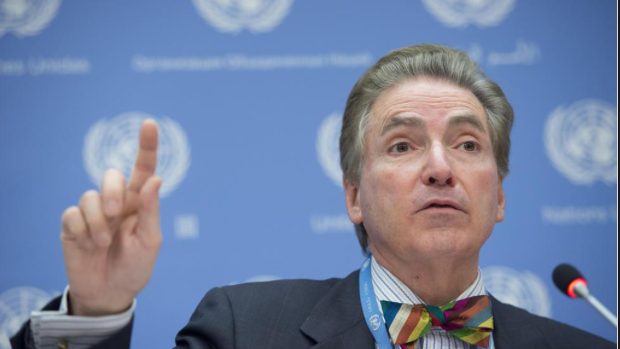15.03.2017 - 15:43
|
Actualització: 19.12.2017 - 10:39
United Nations human rights special representative Alfred-Maurice de Zayas has become involved in the Catalan independentist process. He did so last January, when he sent a letter to the Spanish Embassy in Geneva and to the Spanish permanent office at the United Nations and other international organisations, in which he expressed concern for the legal persecution of Catalan political leaders involved in the 9-N. De Zayas is an independent expert of the United Nations Commission on Human Rights ‘on the promotion of an international democratic and equitative order’.
In this interview with VilaWeb, De Zayas tries to keep a neutral tone on the political conflict between Catalonia and Spain, but maintains that the right to self-determination cannot be subject to the maxim of ‘the law is law’, and, as it is, this also applies to the Catalan case. He therefore calls upon the Spanish authorities to make a broad and not a restrictive interpretation of the constitution and the laws, to enable a democratic and agreed outcome to the Catalan process.
—Have you received an answer to the letter you sent to the Spanish Embassy in Geneva?
—The letter is on the way and I have had the chance to talk to the mission. My report to the United Nations General Assembly in 2014 (A/69/272) focuses on the free determination of peoples as a strategy for preventing conflicts, and proposes discussion to reach an agreement in accordance with the United Nations Charter and the human rights agreements. This free determination can be performed in a federal state with more autonomy for a region or province, or may be external, with secession. There are precedents of both solutions, but in either case, mutual respect must prevail. My report proposes fifteen criteria to apply the right to free determination in a peaceful, and above all lasting, way.
—You expressed concern at the judicial treatment of the political conflict. What consequences might this have?
—The independence of the judiciary is fundamental in a state of law, and political dialogue should not resort to the use of the judicial apparatus, and especially criminal law. The United Nations Special Procedures can provide guidance in this area, if they are asked to do so. Naturally as representatives, we have no power of initiative and cannot invite them to do this.
—Former president Mas has been banned from public office for having organised the 9-N consultation. At the same time, Nicola Sturgeon was announcing a 2nd referendum in Scotland. Could you ever imagine the Scottish independentists being taken to court?
—I reiterate the primacy of international law and fundamental human rights, such as the right to free determination of peoples. I think it would have been absurd if the independentist leaders of Scotland, Québec or Montenegro had been subject to trials and sentences.
—What you think of the Reformation of the Spanish Constitutional Court by which it assumes sanctioning and coercive capacity to the extent of being able to suspend public posts failing to observe its judgements?
—The Venice Commission has just announced its opinion on this matter. I would highlight a few of the doubts it expresses: «On the basis of a comparative view, the [Venice] Commission believes that the responsibility of the Constitutional Court in contributing to the execution of its own decisions is the exception, and that this job is usually attributed to other state powers. The attribution of general and direct responsibility to execute the decisions of the Constitutional Court must be examined once more in order to promote the image of the court as a neutral arbiter, as a judge of laws. For all measures of execution, the court must not act automatically, but on the request of the parties. […] Questions may be posed concerning the severe repetitive and coercive sanctions applied to the individuals and the suspension of civil servants from office.» Obviously one can think that what the Venice Commission questions is all very well, because the constitution can be corrected and the law is law …
—In other words, a rigid view of Spanish legislation.
—The fact is that law is not only that which is coded, but also depends on the spirit of the constitution itself, on the regulations. It is Montesquieu. Article 10 of the Spanish constitution is particularly important. In the first point, it says, «The dignity of the person, the inviolable rights inherent to them, the free development of personality, the respect for law and the rights of others are the basis of political order and social peace;» and in the 2nd point, it says, «The regulations of the fundamental rights and freedoms that the constitution recognises will be interpreted in accordance with the Universal Declaration of Human Rights and the international treaties and agreements thereon ratified by Spain.»
—What do you mean?
—That a decision is necessary not only on the procedures, but also on the substance of the laws, and particularly the law to free determination, which is jus cogens, in other words a right well established in the United Nations Charter and in article 1 of the International Covenant on Civil and Political Rights. In this sense, it is also necessary to highlight the importance of article 96 of the Spanish constitution, which stipulates that international law is part of Spanish law, and it is therefore necessary to remember that it includes the International Covenant on Civil and Political Rights of the European Human Rights Convention. In a broad sense, the Constitutional Court is responsible for interpreting all of the regulations, and even the international law of human rights.
—The Catalan government is determined to hold a referendum in September, and the Spanish government is determined to prevent it. To what extent might the conflict be exacerbated by these positions?
—The most urgent thing is to maintain dialogue and social peace in Spain and Catalonia. The referendums in Scotland (2014), Quebec (1995) and Montenegro (2006) were held peacefully and are therefore good precedents. The ‘velvet divorce’ through negotiations between Czechs and Slovaks in 1992 is also an example of amicable separation.
—What consequences might it have?
—Violence in a member state of the Council of Europe and the European Union would be inconceivable and would be a tremendous loss for everyone. The state of siege, as provided in article 116 of the Spanish constitution, cannot be invoked to avoid or destroy the right to free determination.
—Considering the present political situation, do you still think a referendum agreed between the Spanish and Catalan governments can still be held in Catalonia?
—I hope so, and by venture with the support and supervision of the United Nations as in previous cases of referendums in Eastern Timor, Ethiopia-Eritrea and Sudan. I myself was an official United Nations observer at the Parliamentary and presidential elections of the Ukraine in March and June 1994. International participation gives any consultation more legitimacy and sustainability, and the Organisation for Security and Cooperation in Europe can also attend elections or referendums as an observer.
—If the referendum is not agreed upon, is it legitimate for the Catalan government to hold one?
—I am not a Spanish or Catalan jurist and I cannot give an opinion on the interpretation of the constitution. But what I do say is that free determination is a fundamental right which the United Nations has reaffirmed in many resolutions, the implications of which no constitutionalist can ignore. Here I also refer to the conclusions of the UNESCO conference held in Barcelona in 1998, in which the importance of free determination was underlined as a strategy to avoid conflicts.
—What conditions would the referendum have to meet to be valid and for the result to be internationally recognised?
—I would suggest a participation of 70% or 75% of Catalan voters (in Quebec it was a participation of 93% of the voters), and a substantial two thirds majority of the voters, and in any case under the supervision of the United Nations.
—To what extent can a minimum participation in the referendum be required when there is a risk of boycott by those against?
—It is necessary despite this. An abstention is a vote against; secession is a very important thing to be decided by a minority.
—The code of good practices for referendums of the Venice Commission establishes no minimum participation …
—But common sense and legitimacy require it.
—Do you think there is a risk of a breakdown of democratic health in the Spanish state?
—This risk exists in all countries, which is why civil society has to ensure that there is constructive dialogue, and a lot of patience.
—Who is Alfred-Maurice de Zayas?
—Born in Havana in 1947, he is a North American lawyer and an expert in human rights and international law. In 2012, he was appointed by the United Nations Human Rights Council as an independent expert for the promotion of a democratic and equitable order, a post he will hold until 2018. He is also a professor of international law at the School of Diplomacy and International Relations and worked for the United Nations as a lawyer in the Office of the Commission for Human Rights. He was secretary of the Human Rights Committee and responsible for petitions. He has specialised in different areas: the Armenian genocide, the Holocaust, the Guantánamo detention centre, the ethnic cleansing in the former Yugoslavia, the expulsion of Germans from Eastern Europe after the Second World War, the Turkish invasion of Cyprus in 1974, the rights of minorities, the right to freedom of expression and opinion, and the right of indigenous peoples.



